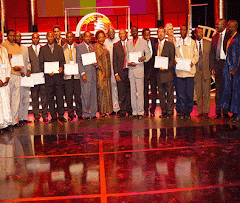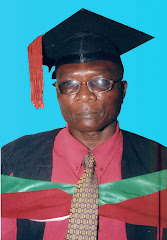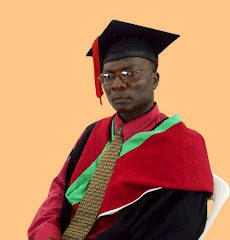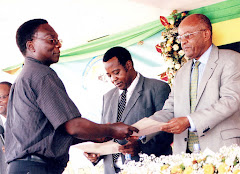Water is a critical for sustainable development including environmental integrity and alleviation for poverty and hunger. The improvement of water supply and its sources for human well-being is recognized as fundamental human right and indispensable for human health. Having seen the importance of water, Tanzania government through the Ministry of Water and Irrigation celebrated national water-week with other nations worldwide in mid March. This year’s annual event was celebrated at the national level at Mwendapole in Kibaha coast region under the theme “Clean and safe water for better health”. The theme highlights the significance of water quality, reflecting its cooperation and the importance of integrated approach to water resources management and communicate messages on eco-systems and human well-being at both international and local levels. A colorful one week event allowed stakeholders within the sector inside and outside Tanzania to share experience on development and management of water and sanitation through exhibitions. ‘Maji week’ as it is known in Tanzania is mainly used for dissemination of the water policy strategy and water sector development programs. All regions in the country devoted the week, as appropriate in the local context, to activities such as the promotion of public awareness on water issues through publications and dissemination of documentaries. In this special day that is being commemorated annually, allows stakeholders of the water industry in the country, the Department of Water Resources in the ministry of Water Development to highlight various strategies of getting safe drinking water and the need to promote the rainwater harvesting technology in Tanzania cheaply for the rural people as well as urban dwellers.
The main objective of the event is to create awareness and sensitize the public on water sector plans and reforms, and the importance of their participation in environmental sanitation and water supply programs, evaluate the achievements, identify problems and draw up strategies for implementation. This event allows stakeholders within the sector, inside and outside Tanzania to exchange their experiences on the development and management of water and sanitation through exhibitions which had been staged at the climax. Tanzania communities have complex priorities for the use of water for economic activities and for household use, but as well for maintaining health of the people in rural areas. Men and women often have different priorities and responsibilities as well as cultural conditions to determine indigenous practices and societal values that determines how people perceive and manage water sustainably. Statistics shows that, Tanzania has sufficient water resources to meet most of its present needs and they include surface and underground sources. About 7 percent of the land surface is covered by three natural lakes (all of them have fresh water) which border the country apart from other inland lakes. The three lakes includes Lake Victory which is the second largest in the world, Lake Tanganyika, the second deepest lake in the world and the third one is lake Nyasa. Inland lakes includes Rukwa, Eyasi and Manyara.
 In Tanzania water supply is still a problem in rural communities. People and the government depend on the donor assistance who helps in drilling boreholes.
In Tanzania water supply is still a problem in rural communities. People and the government depend on the donor assistance who helps in drilling boreholes.There are also big rivers flowing to the lakes. Underground water is also another important source of water for both urban and rural settlement areas. There is a great variation of water availability between parts of the country. The variation is explained by differences in topography, rainfall pattern and climate. About one third of Tanzania receives less than 800mm of rainfall per annum and they are considered as arid or semi arid. The country experiences a long dry season normally extending from June to October which has an effect of low river flows and drying of water reserves. Surface water resources in the country consists of lakes, rivers, springs man-made reservoirs and natural ponds. Considerable water resources exist in the country’s lakes namely Tanganyika, Nyasa, Rukwa, Eyasi and Natron. About 50 percent of the surface run water is derived from the main rivers flowing directly to the Indian Ocean and these are Pangani, Wami, Mkondoa, Ruvu, Rufiji, Ruaha, Kilombero, Mbarangandu, Matandu, Mbwemkuru, Likuledi and Ruvuma rivers. The remaining 50 percent is divided into surface water drainage into the main internal drainage basins which have no outlet to the sea. Tanzania has 5,439,000 ha of lakes and swamps which represent 5.8 percent of the totals land surface, but this number excludes seasonally inundated flood plains. Ground water is major source of water for many areas in Tanzania and actually the most viable in the central and northern parts of the country the drier regions of Dodoma, Singida, Shinyanga, Tabora, Mwanza, Mara, Arusha, Coast and southern Kilimanjaro. In Tanzania, Drilling and Dam Construction Agency (DDCA) is an active player towards improving water supply services in the country. Its role as a government agency is to develop sustainable and safe water sources through efficient means and at cost effective price. This objective is in line with the national objective of alleviating poverty and improving the health of people through provision of clean, safe and adequate water supply to rural and urban population.
DDCA’s vision is to be the leading and most efficient organization in the country in the business of water well drilling and construction of water storage dams, by providing sustainable water sources and ensuring that clients get value for money from services provided. About 4,000 deep boreholes have been drilled by it since its launch in 1999. This achievement signifies that DDCA serves large number of people and livestock, industrial works, and various construction industries in the country. Water sector development in Tanzania is governed by the water sector policy. The current water sector was issued in 1991. However, recently the government has embarked on a policy reform program that covers the entire social-economic political body, including water sector. According to the Ministry of Water and Irrigation in the country, Tanzanian government is highly committed to realize its vision of improving water supply to reach at a level of 90 percent of the total country’s population if it would really want to achieve its National Development Vision for 2025, says an expert in water sector from the ministry headquarter. Senior officials have repeatedly said that without the availability of water for domestic and other uses, the country could not achieve the UN’s Millennium Development Goals (MDGs) as well as the National Strategy for Growth and Poverty Reduction (MKUKUTA).
Tanzania’ water policy targets are to raise the proportion of rural population that has access to safe and clean water from 53 to 65 percent by June 2010 and for urban population in the same period from 73 to 890 percent. There are also pressure from the agricultural and energy sectors, where growth depends on increased supply of water for irrigation and hydro-electric power generation. In urban centers, there are 19 authorities responsible for development supply schemes, where the strategies involve commercialization of water supply and sanitation services according to the reports by the ministry. Commercialization is seen as the next step forward in urban water supply. Sewerage services would continue to be provided as part of an overall sanitation strategy for the urban area. However, plans for rural and urban water supply and sewerage services are only achievable if secured water resources are available, protected and used sustainable, a factor that is now a matter of serious concern. Water is indispensable element for sustaining people’s lives, growth and mankind development. Water is a critical for sustainable development including environmental integrity and alleviation for poverty and hunger. Water supply for human well-being is recognized as fundamental human right and indispensable for human health. This recognition thus entitles everyone to sufficient, affordable, physically accessible safe and acceptable water for domestic, construction and production use.
However, the world today has experienced fast diminishing of this natural resource as demand of fresh water continue to rise in response to rapid population growth. In Tanzania like elsewhere in the world, the use of water caters for the increased urbanization and is also necessary for fast industrial and economic development. It also caters for increased agricultural demand for irrigation. As a result, according to UN estimates, one billion people in the world have no access to safe drinking water, and two billion people lack basic sanitation. The UN general assembly at its 58th session in December 2003 proclaimed the year 2005-2015 as international decade for Action Water for Life. In order to ensure an effective implementation of this concept, Tanzania needs over US$ 1 billion in investment. Water is fundamental natural resource for socio economic development since the millennium summit’s declaration of the Millennium Development Goals (MDGs) in 2000 as an agenda of reducing poverty and improving lives of people in the world.





















